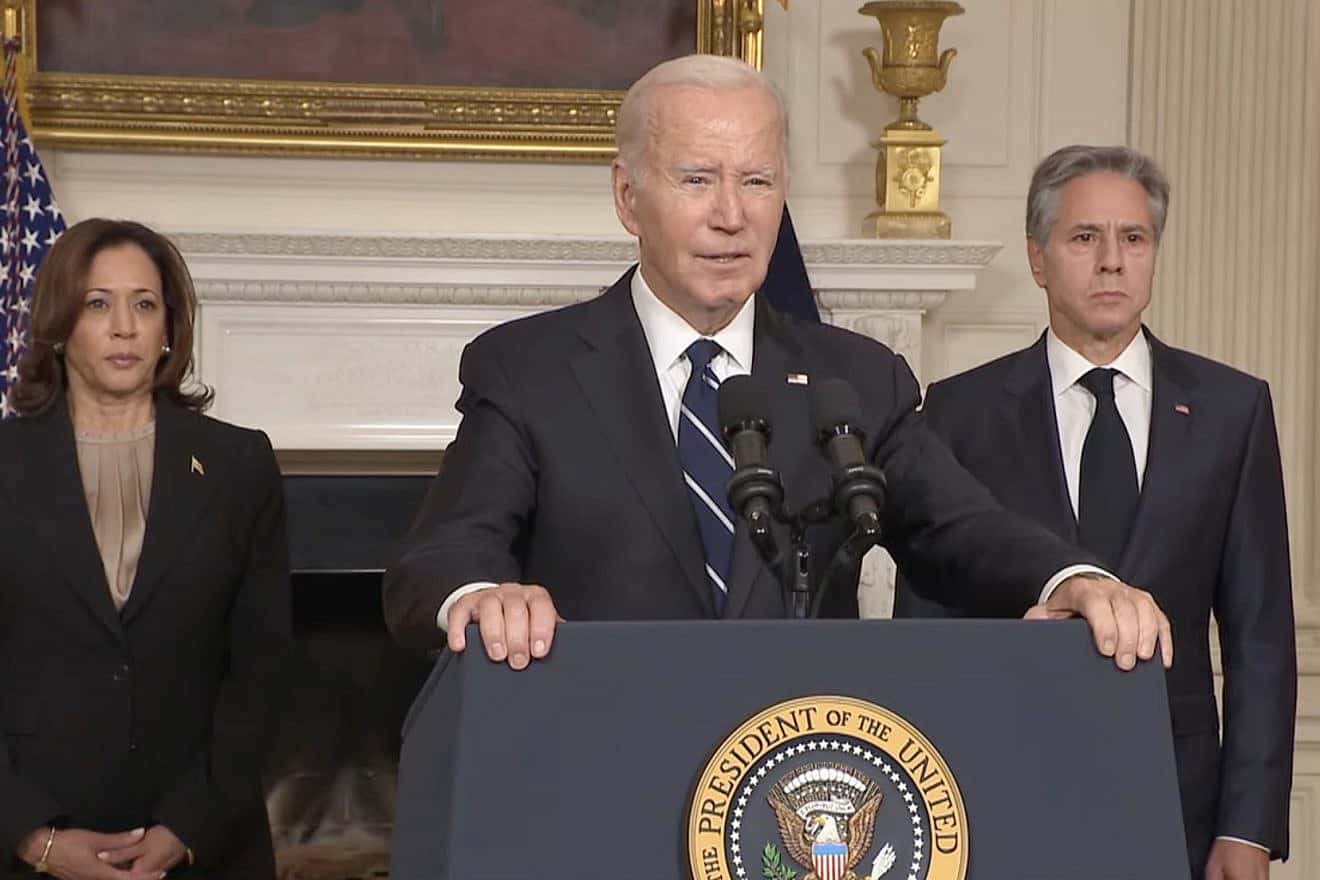by Joshua Marks
The major foreign policy shift would face deep opposition within Israel.
 |
| U.S. President Joe Biden addresses the nation about Israel, flanked by Vice President Kamala Harris and Secretary of State Antony Blinken, Oct. 10, 2023. Source: YouTube/White House. |
The Biden administration is bucking decades of U.S. foreign policy by considering a plan to unilaterally recognize a Palestinian state, despite deep opposition to the move within Israel.
Both Axios and The New York Times reported on Wednesday about this potential major shift in the American approach towards Palestinian statehood, which hitherto has emphasized direct negotiations between Jerusalem and Ramallah.
According to the Axios report, which cites two U.S. officials familiar with the situation, Secretary of State Antony Blinken requested a review of policy options for the recognition of a Palestinian state after Israel’s war against Hamas in Gaza concludes.
In the months since the Oct. 7 terrorist assault on southern Israel, the Biden administration has been pushing for Palestinian statehood as part of a major normalization pact and regional security initiative between Israel and Saudi Arabia.
The Palestinian issue was not reportedly seen as a major obstacle to a Jerusalem-Riyadh detente before the Hamas attack, but the Biden administration’s stance has apparently changed and the Saudis are emphasizing a pathway to a Palestinian state as a precondition for normalization.
A senior U.S. official told Axios that some inside the Biden administration believe that unilateral recognition of a Palestinian state should be the first step in talks to resolve the Israeli-Palestinian conflict instead of the last.
This goes against the doctrine of Prime Minister Benjamin Netanyahu, who sees increasing relations with the wider Arab world as the key to solving the Palestinian issue, as exemplified by the 2020 Abraham Accords, which saw Israel establish diplomatic ties with the United Arab Emirates, Bahrain, Morocco and Sudan in a deal brokered by the Trump administration.
Netanyahu’s right-wing and religious coalition is firmly against establishing a Palestinian state.
There is also widespread opposition among the Israeli public to the creation of a Palestinian state.
According to the most recent “Peace Index” survey released by Tel Aviv University last week, when asked whether they support the creation of a “Palestinian” state alongside Israel, 66% of Jewish respondents said they opposed such a move, while 27% expressed support for the creation of a “Palestine.”
New York Times columnist Thomas Friedman wrote that the Biden push to possibly recognize a demilitarized Palestinian state in Judea, Samaria and the Gaza Strip “would come into being only once Palestinians had developed a set of defined, credible institutions and security capabilities to ensure that this state was viable and that it could never threaten Israel.”
He continued, “Biden administration officials have been consulting experts inside and outside the U.S. government about different forms this recognition of Palestinian statehood might take.”
According to Friedman, the “Biden doctrine for the Middle East” would also include a strong stance against Iran, including a military response against Iranian terror proxies in the region in retaliation for the killing of three U.S. soldiers at a base in Jordan in a drone attack. It would also involve a “vastly expanded” U.S. security alliance with Saudi Arabia that would include Israel-Saudi normalization.
Furthermore, Axios reported on several options the Biden administration could take, including bilateral recognition of a Palestinian state, withdrawing its veto power against the United Nations Security Council admitting “Palestine” as a full U.N. member state, and urging other countries to recognize a Palestinian state. British Foreign Secretary David Cameron said on Monday that the U.K. was considering recognizing a Palestinian state.
Blinken is expected to meet with Israeli Strategic Affairs Minister Ron Dermer in Washington on Thursday to discuss the Gaza war and plans for the day after fighting in Gaza ends, as well as Israel-Saudi normalization. Dermer held similar talks with U.S. National Security Advisor Jake Sullivan on Wednesday.
Moreover, Blinken will visit Israel for three days beginning on Feb. 3, his sixth trip to the Jewish state since Hamas invaded the northwestern Negev on Oct. 7.
Joshua Marks
Source: https://www.jns.org/biden-doctrine-us-reviews-options-for-recognizing-palestinian-state/
No comments:
Post a Comment